Bowes Surname Ancestry ResultsOur indexes 1000-1999 include entries for the spelling 'bowes'. In the period you have requested, we have the following 676 records (displaying 11 to 20): Single Surname Subscription | | | Buying all 676 results of this search individually would cost £3,588.00. But you can have free access to all 676 records for a year, to view, to save and print, for £100. Save £3,488.00. More... |
These sample scans are from the original record. You will get scans of the full pages or articles where the surname you searched for has been found. Your web browser may prevent the sample windows from opening; in this case please change your browser settings to allow pop-up windows from this site. Indults for Portable Altars: Diocese of Durham
(1404-1415)
Individuals (laymen, monks or priests) could obtain indults or indulgences from the Pope to possess portable altars, enabling them to do their devotions in unconsecrated places. The fee was 10 groats for one person, 12 for two (frequently a husband and wife). Lists of these indults, headed De Altaris Portatilibus, were entered in the Lateran Regesta in the Vatican archives; from the reigns of popes Innocent VII to John XXIII (1404 to 1415) there are such lists in volumes CXIX, CXXXI, CLIX to CLXI, CLXV, CLXVII and CLXXXIV, from the first year of Innocent VII, the second year of Gregory XII, and the second to fifth years of John XXIII. Those relating to the British Isles were copied and translated by J. A. Twemlow, and printed under the direction of the Master of the Rolls in 1904. The diocese of Durham comprised county Durham and most of Northumberland.BOWES. Cost: £4.00.  | Sample scan, click to enlarge
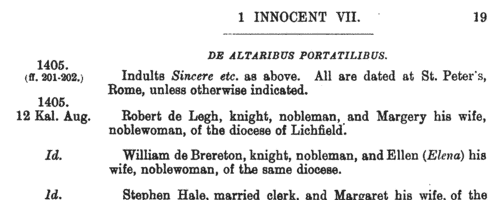
| Indults to Choose Confessors: Diocese of Durham
(1404-1415)
Individuals (laymen, monks or priests) could obtain indults or indulgences from the Pope to choose their confessor, who might, after hearing their confession, grant them absolution, and enjoin a salutary penance, except in cases reserved to the apostolic see. Lists of these indults, headed De Confessionibus, were entered in the Lateran Regesta in the Vatican archives; from the reigns of popes Innocent VII to John XXIII (1404 to 1415) there are such lists in volumes CXIX, CXXXI, CLIX to CLXI, CLXV, CLXVII and CLXXXIV, from the first year of Innocent VII, the second year of Gregory XII, and the second to fifth years of John XXIII. Those relating to the British Isles were copied and translated by J. A. Twemlow, and printed under the direction of the Master of the Rolls in 1904. The diocese of Durham covered county Durham and most of Northumberland.
BOWES. Cost: £4.00.  | Sample scan, click to enlarge
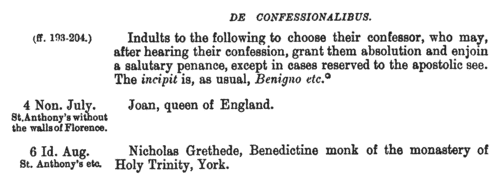
| Grantees of offices, commissions and pardons
(1413-1416)
The Patent Rolls are the Chancery enrolments of royal letters patent. Those for the 1st, 2nd and 3rd years of the reign of king Henry V (21 March 1413 to 20 March 1416) were edited for the Public Record Office by R. C. Fowler, and published in 1910. The main contents are royal commissions and grants; ratifications of ecclesiastical estates; writs of aid to royal servants and purveyors; and pardons. The commissions of the peace issued for the English towns and counties and entered on the rolls, being largely repetitive, have been consolidated in a single appendix.BOWES. Cost: £2.00.  | Sample scan, click to enlarge

| Norman Rolls
(1200-1417)
The dukedom of Normandy is one of the appendages of the English crown, but actual possession of the dukedom was actively contested by the kings of France. During the periods of English power records were kept for Normandy similar to those of the royal administration in England, with enrolment of letters and grants of liberties and privileges and confirmations of previous enjoyed rights. The rolls for 1200 to 1205 and during the reassertion of English rule under Henry V in 1417, were edited by Thomas Duffus Hardy for the Commissioners of the Public Records, and published in 1835. Most of the persons mentioned are French inhabitants of Normandy or Englishmen in France, but there is also a long section (from page 122 onwards) of valuation of lands of Normans in England, where English jurors, county by English county, attest to acreage, numbers of cattle &c.BOWES. Cost: £4.00.  | Sample scan, click to enlarge

| The English in France
(1423)
King Henry VI of England (one of the grandsons of Charles VI of France) claimed the throne of France (and quartered the fleurs-de-lis of France with the lions of England on the royal standard) as had his predecessors since Edward III, as descendants of Philip IV of France. The English had real power or influence in Brittany, Normandy, Flanders and Gascony, and actual possession of several coastal garrisons, in particular Calais, where the French inhabitants had been replaced by English. Henry VI came to the throne only seven years after his father had trounced the French at Agincourt; but his cousin, Charles VII, who became king of France in the same year, spent his long reign rebutting the English king's claim to his throne by territorial reconquest and consolidation. The English administration kept a series of records called the French Rolls. On these are recorded royal appointments and commissions in France; letters of protection and safe-conduct to soldiers, merchants, diplomats and pilgrims travelling to France from England and returning, and to foreign legations. There are also licences to merchants to export to the Continent, and to captains to transport pilgrims. As Henry VI's reign progressed, and the English grip on northern France loosened, the French Rolls also increasingly include entries concerning the ransoming of English prisoners.BOWES. Cost: £6.00.  | Sample scan, click to enlarge
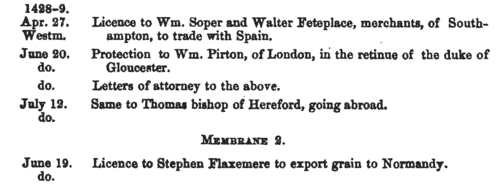
| The English in France
(1426)
King Henry VI of England (one of the grandsons of Charles VI of France) claimed the throne of France (and quartered the fleurs-de-lis of France with the lions of England on the royal standard) as had his predecessors since Edward III, as descendants of Philip IV of France. The English had real power or influence in Brittany, Normandy, Flanders and Gascony, and actual possession of several coastal garrisons, in particular Calais, where the French inhabitants had been replaced by English. Henry VI came to the throne only seven years after his father had trounced the French at Agincourt; but his cousin, Charles VII, who became king of France in the same year, spent his long reign rebutting the English king's claim to his throne by territorial reconquest and consolidation. The English administration kept a series of records called the French Rolls. On these are recorded royal appointments and commissions in France; letters of protection and safe-conduct to soldiers, merchants, diplomats and pilgrims travelling to France from England and returning, and to foreign legations. There are also licences to merchants to export to the Continent, and to captains to transport pilgrims. As Henry VI's reign progressed, and the English grip on northern France loosened, the French Rolls also increasingly include entries concerning the ransoming of English prisoners.BOWES. Cost: £6.00.  | Sample scan, click to enlarge
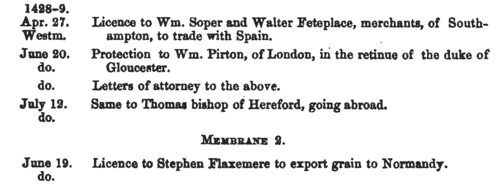
| Close Rolls
(1429-1435)
The close rolls of the 8th to 13th years of the reign of king Henry VI record the main artery of government administration in England, the orders sent out day by day to individual officers, especially sheriffs of shires: they are an exceptionally rich source for so early a period. There is also some material relating to Wales, Scotland, Ireland and the English possessions in France. Also included is the Exchange Roll of 1424 to 1434, of licences to transmit sums of money out of the realm.BOWES. Cost: £4.00.  | Sample scan, click to enlarge

| Close Rolls
(1441-1447)
The close rolls of the 20th to 25th years of the reign of king Henry VI record the main artery of government administration in England, the orders sent out day by day to individual officers, especially sheriffs of shires: they are an exceptionally rich source for so early a period. There is also some material relating to Wales, Scotland, Ireland and the English possessions in France. BOWES. Cost: £4.00.  | Sample scan, click to enlarge

| The English in France
(1448)
King Henry VI of England (one of the grandsons of Charles VI of France) claimed the throne of France (and quartered the fleurs-de-lis of France with the lions of England on the royal standard) as had his predecessors since Edward III, as descendants of Philip IV of France. The English had real power or influence in Brittany, Normandy, Flanders and Gascony, and actual possession of several coastal garrisons, in particular Calais, where the French inhabitants had been replaced by English. Henry VI came to the throne only seven years after his father had trounced the French at Agincourt; but his cousin, Charles VII, who became king of France in the same year, spent his long reign rebutting the English king's claim to his throne by territorial reconquest and consolidation. The English administration kept a series of records called the French Rolls. On these are recorded royal appointments and commissions in France; letters of protection and safe-conduct to soldiers, merchants, diplomats and pilgrims travelling to France from England and returning, and to foreign legations. There are also licences to merchants to export to the Continent, and to captains to transport pilgrims. As Henry VI's reign progressed, and the English grip on northern France loosened, the French Rolls also increasingly include entries concerning the ransoming of English prisoners.BOWES. Cost: £6.00.  | Sample scan, click to enlarge
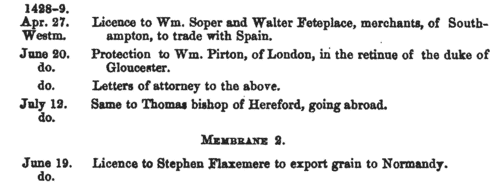
| Yorkshire Testators and Legatees
(1426-1466)
Wills and testaments from the diocese of York (Yorkshire, Nottinghamshire, Hexhamshire, Lancashire north of the Ribble, and southwest Westmorland) registered at York. Richmond and Southwell archdeaconries had their own lower probate jurisdictions, so the wills registered at York are predominantly from the East and West Ridings and the eastern part of the North Riding of Yorkshire. In theory, wills dealt with real property and testaments with personal property, but the distinction hardly applies in practice: most of these wills are in Latin, but some are in English. Being before the Reformation, they commonly start with benefactions to churches, chantries, chapels, &c., and with provisions for the burning of candles ('lights') and saying of masses.BOWES. Cost: £4.00.  | Sample scan, click to enlarge

|
Research your ancestry, family history, genealogy and one-name study by direct access to original records and archives indexed by surname.
|












